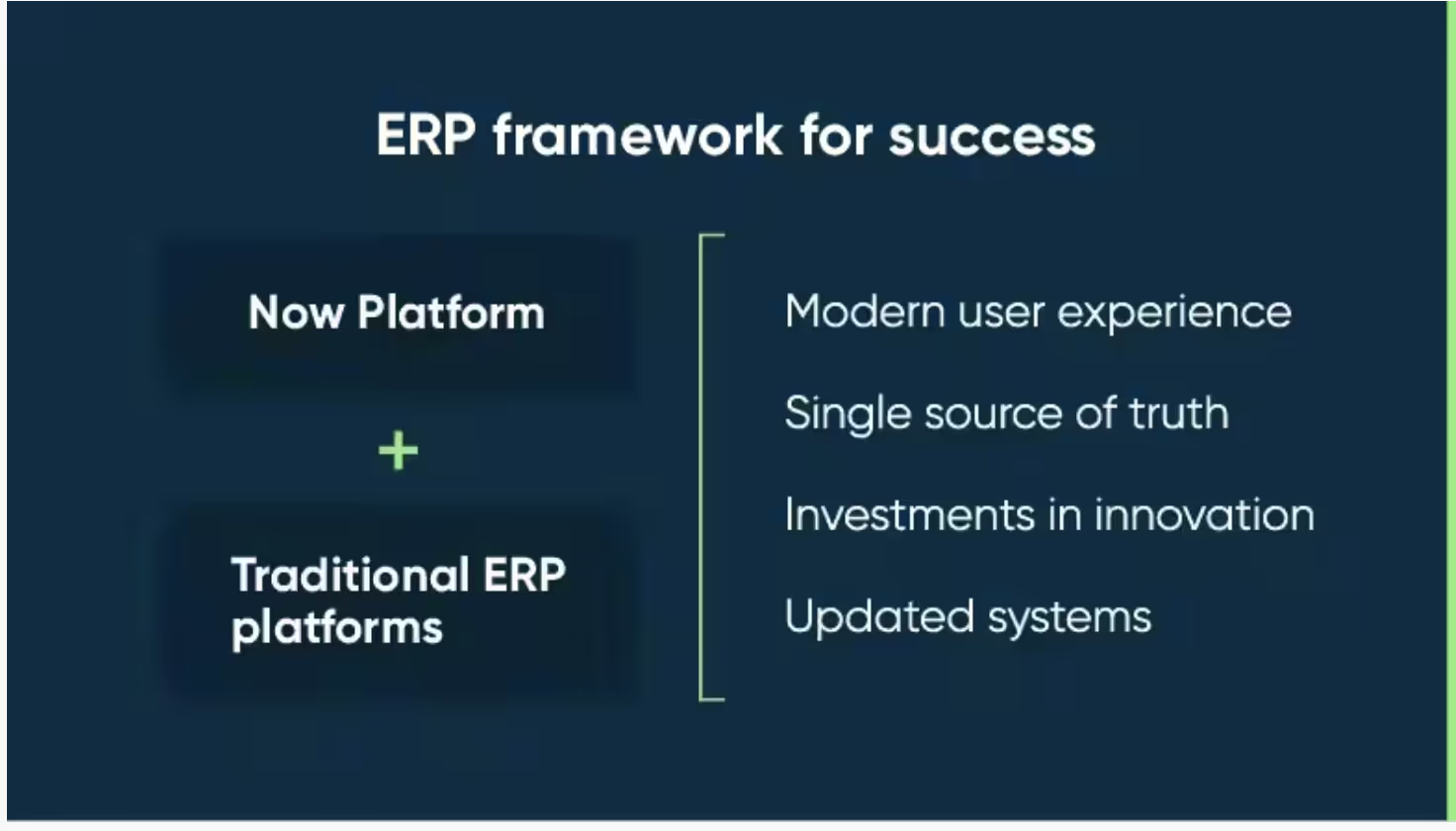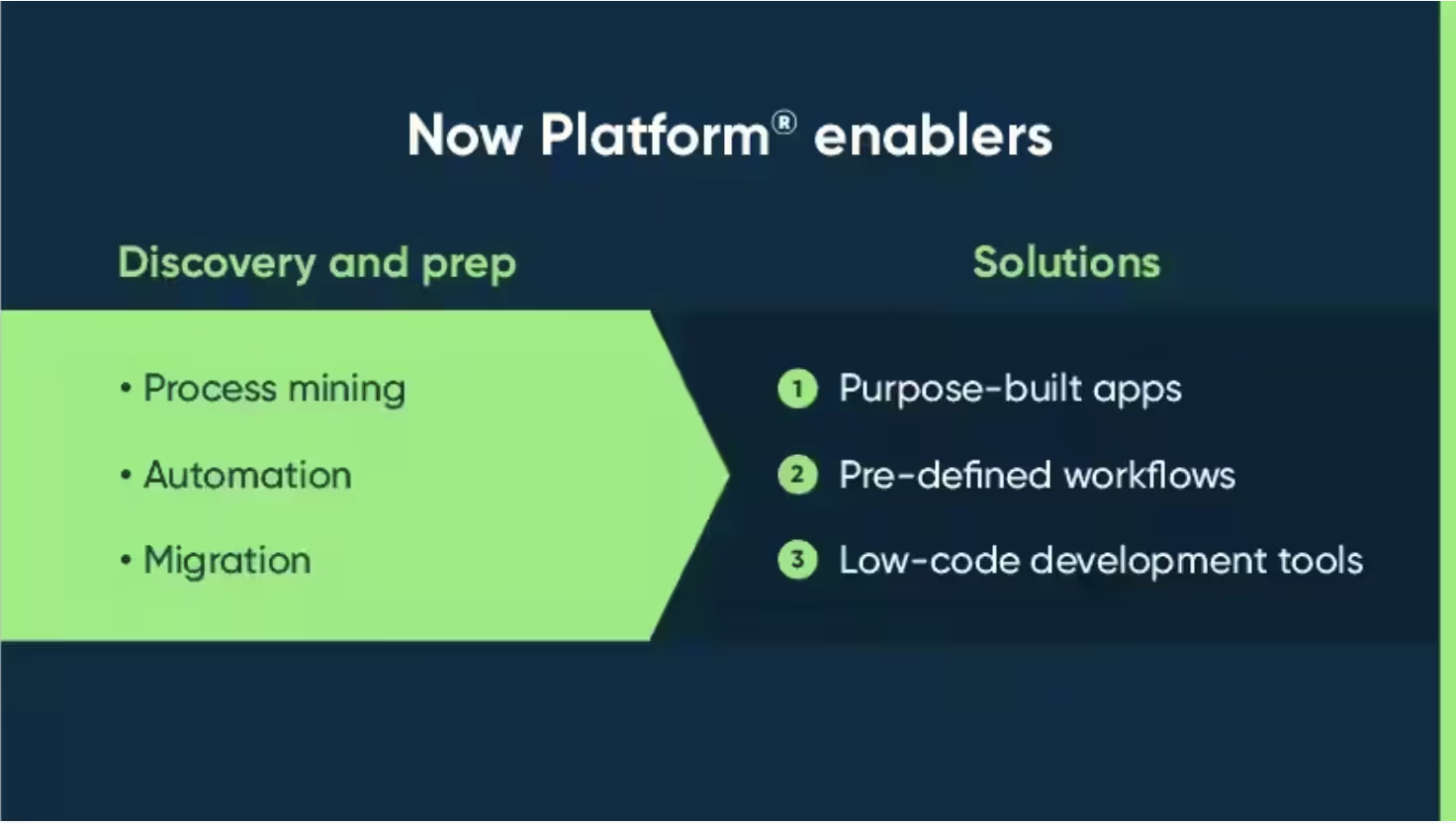The next step in ServiceNow ERP operations: How we can deliver business agility
Many businesses are facing mounting pressure to modernise their ERP systems to accelerate market responsiveness, cut costs, and boost operational efficiency. However, the reality is far from straightforward: current ERP systems are overly complex with years of custom code modifications, expensive upgrade costs, and lack the flexibility needed for rapid market changes.
In this context, the Now Platform with ServiceNow ERP modernisation tools emerges as a safe and intelligent alternative strategy: rather than dismantling core running systems, it adds an "intelligent layer" to modernise processes, improve user experience, and dramatically reduce operational costs while increasing ROI by up to 230%.

Keep reading to explore Novabridge’s recommendation on how we can deliver business agility. Honestly, we’re total nerds for it!
What is ServiceNow’s ERP Modernisation capabilities?
ERP, or Enterprise Resource Planning, refers to software systems that help businesses plan and manage enterprise resources. These systems help organisations manage and automate core business functions such as finance, supply chain, procurement, and human resources on a single platform.
Through process automation and real-time data synchronisation capabilities, ERP helps businesses operate more efficiently, boost productivity, and make faster decisions. Platforms like SAP and Oracle have long been the backbone of enterprises, but this very strength has made them rigid, difficult to change, and incredibly complex with thousands of custom code lines developed over 5-10 years, not to mention substantial maintenance costs.
This is when ServiceNow can add value with its ERP Modernisation capabilities. Rather than replacing existing systems, they complement, support, and extend the capability to modernise business processes in a more flexible, faster, and smarter way. Since 2021, ServiceNow has been leading this transformation approach.
Why organisations can benefit from ServiceNow’s ERP modernisation capabilities
Real-world challenges of current ERP systems
ERP environments are often complex, requiring many manual processes across siloed systems. Even the largest corporations face a harsh reality: ERP systems have become deeply entrenched over decades, becoming unwieldy and immobile in the face of digital transformation. Common challenges include:
- Complex custom code, layered over years of implementation that no one dares to touch
- Every process change requires waiting for IT, sometimes even hiring external consultants
- Poor user experience, resulting in actual usage rates lower than expected
- High upgrade or expansion costs with limited flexibility
- Lack of ability to adapt to markets changing weekly, not yearly
Why not sort out the current ERP system directly?
Removing custom code from existing ERP systems is expensive, complex, and risky:
- ERP customisation runs too deep: ABAP and PL/SQL code written 5-10 years ago that no one fully understands anymore
- Removal affects entire running business processes: Easy to cause disruption, data loss, and process errors
- High costs due to ERP vendor dependency: Every modification requires hiring SAP/Oracle partners → time-consuming and expensive
- No tools for analysing custom code: No way to know which lines are in use and which aren't
Therefore, large enterprises cannot and dare not gamble their entire organisation on such risks.
ServiceNow ERP modernisation solutions
ServiceNow ERP tools don't require businesses to "tear down and rebuild" their systems for compatibility.
- Doesn't replace ERP but "wraps around" it: ERP maintains its role as the data centre, while peripheral processes are digitised using App Engine
- Runs in parallel – no impact on main system: Teams can use ServiceNow without needing to change ERP
- Tight integration with ERP when needed: Full connectivity through APIs and integration hubs
- Increases process innovation capability: No need for specialised developers – business users can drag-and-drop new logic and eliminate overly complex bottlenecks from old environments so new environments don't get "contaminated"

Benefits of ServiceNow ERP Modernisation Tools
“The key benefits are around removing customisations in SAP to make it easier and more cost effective for companies to upgrade from the on prem ECC version of SAP to the cloud based S4/HANA version.” - Herman Taljaard, Director of Innovation at Novabridge.
ServiceNow has acquired Geckobrain in 2021 and they now have the ability to scan a customer's SAP environment from ServiceNow to understand the level of custom workflows and processes in SAP and to map out the best way to remove these from SAP.
- Transform user experience: Legacy SAP screens are replaced with user-friendly, mobile-compatible interfaces on the Now Platform
- Eliminate manual emails: All approval processes for expenses, budget requests, and service requests now occur in modern apps with clear logging
- Reduce technical debt: No more custom code modifications in ERP – use drag-and-drop apps developed in ServiceNow’s App Engine
- Increase decision-making capability: Dashboards, KPIs, and SLAs are all visual and real, not manually compiled
Through platforms like Creator Workflows and App Engine inside the Now Platform of ServiceNow, organisations rapidly build drag-and-drop business applications with low-code, even no-code capabilities; automate real-time approvals; seamlessly integrate with ERP data; and even apply AI to decision-making processes. All within a single, consistent, and easily scalable system.
Forrester TEI report shows that:
- 230% ROI achieved within 3 years with ServiceNow App Engine
- 62% reduction in application development time compared to traditional methods
- Total operational savings exceeding $2.1 million USD
This demonstrates that the Now Platform with ServiceNow ERP tools isn't an additional new expense, but a cost optimisation tool that cuts invisible financial leaks that businesses have accepted for decades. The result is rapid innovation with low risk, without the hassle of dismantling old systems.
ServiceNow's ERP transformation toolkit

Not every tool suits every business. However, the Now Platform with a comprehensive and flexible solution suite is suitable for most organisational scales:
- App Engine Studio: Create business applications quickly without coding
- Flow Designer: Automate complex processes through drag-and-drop logic
- Integration Hub: Connect data from SAP, Oracle, Salesforce, without building integrations from scratch
- Virtual Agent: AI chatbot for automated internal or customer support
- Performance Analytics: Real-time KPI dashboards and analytics.
Case Study: ServiceNow's own ERP modernisation

ServiceNow isn't just a technology provider but living proof of the digital transformation capabilities of its own platform. In modernising its internal ERP system, ServiceNow applied the "Clean Core" philosophy – keeping the ERP core streamlined while extending processes through Creator Workflows.
The breakthrough results:
- 70% reduction in accounts receivable (AR) errors
- 20% shorter financial closing times
- Over $3.2 million USD saved through operational optimisation
ServiceNow doesn't try to replace ERP but optimises how it is used. This approach – respecting the value of existing systems while strategically adding new capabilities – is the model being chosen by numerous global enterprises in large-scale ERP transformation programmes.
Effective ERP transformation roadmap with ServiceNow
For successful ERP transformation programmes, tools alone aren't enough. What matters is the approach, participating teams, and implementation with clear direction.
Three Critical Role Groups:
- Business Owner/Business Leaders – those who understand processes and business objectives
- IT/ERP Team – those who understand system architecture and data integration
- Implementation Partner – those who consult, design solutions, and implement
Standard Implementation Roadmap:
- Step 1: Survey and map current processes
- Step 2: Identify ERP bottlenecks and gaps
- Step 3: Design and build apps in App Engine
- Step 4: Integrate with existing ERP systems
- Step 5: Test, optimise, and scale
The key here is: don't "tear down and rebuild" – but modernise strategically, piece by piece, with control and flexibility according to business operational reality.
Novabridge - Your trusted partner in ERP transformation
As a trusted ServiceNow partner in Australia and New Zealand, Novabridge has hands-on experience implementing ServiceNow ERP solutions for dozens of large organisations in the region. We’re really good at what we do!
Whether you're:
- Preparing a large-scale ERP transformation programme
- Struggling with over-customised SAP or Oracle systems
- Needing to quickly build workflow applications connecting multiple departments
Novabridge will help you:
- Assess and simplify current ERP system architecture
- Design applications suitable for operational reality
- Maximise value from ServiceNow tools and previously invested systems
We’re special because we’re specialist. 100% of our team are ServiceNow Architect-certified specialists, combined with systematic implementation methodology, ensuring you receive the most effective practical results.
Conclusion
ERP transformation does not mean replacing ERP. With ServiceNow ERP modernisation solutions, businesses can completely modernise processes, optimise operations, and accelerate innovation without dismantling what's working well.
And with Novabridge as your implementation partner, you don't just get tools – you get strategy, people, and trust.
Ready to begin your ERP transformation journey more intelligently? Let Novabridge partner with you.
FAQ
1. Do ServiceNow ERP tools completely replace ERP systems like SAP or Oracle?
No. ServiceNow is a cloud-based platform. While extending beyond ITSM, it doesn't replace existing ERP systems but complements modernisation and automation capabilities around existing ERP systems. It helps businesses maintain stable data cores while making business processes more flexible.
2. Which processes are suitable for digitisation using ServiceNow App Engine?
Cross-departmental processes, multi-step approvals, or those currently handled via email and Excel such as: budget approvals, purchase requests, supplier management, staff onboarding... are all very suitable.
3. What's the average implementation time for ServiceNow ERP tools?
Depending on scale and complexity, but typically takes only 4 to 12 weeks for the first business app, significantly faster than ERP implementation or upgrades.
4. Can I integrate ServiceNow ERP with legacy ERP systems?
Yes. ServiceNow provides strong integration support with SAP, Oracle, Workday, and many other platforms through Integration Hub or open APIs.
5. What do I need to prepare to start implementing ServiceNow ERP with Novabridge?
You only need to identify problematic processes, gather relevant team members, and let Novabridge support roadmap consulting, from business analysis to complete implementation.


